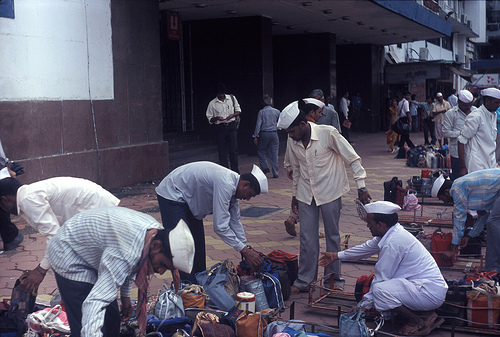Sometimes the wrong train will get you to the right station. ~ From the movie The Lunchbox.
Since the 1890s, dabbawalas have been delivering more than 130,000 lunches to hungry office workers throughout Mumbai six days a week. Set to the rhythm of the Mumbai railway by train, bicycle, and foot, the delivery system brings home cooked food to hungry workers. After the lunchboxes (dabbas) are emptied and the workers fed, the system reverses itself and they are picked up and returned to the cooks.
Despite their simple operating system, the approximately 5,000 dabbawalas operate with rare precision, achieving six sigma or better performance. As noted by Stefan Thomke:
Amazingly, the dabbawalas—semi-literate workers who largely manage themselves—have achieved that level of performance at very low cost, in an eco friendly way, without the use of any IT system or even cell phones. (see Harvard Business Review here and here)
Clearly, I have much to learn from the dabbawalas.
Every morning I take my eight year old son to school, in a nod to Atul Gawande’s The Checklist Manifesto, we use a morning checklist to make sure he doesn’t forget anything.
Xian: “Lunchbox?”
Son: “Check!”
Xian: “Backpack?”
Son: “Check!”
etc.
The system lets me focus on gathering my own stuff, makes my son accountable for gathering his, and lets us both enjoy a worry-free, music-filled drive to school.
So it was that last Thursday, on the same day I published a piece noting that “no plan survives first contact with a child,” my son and I drove off to school without a care in the world listening to tunes from our awesome local radio station, KXCI.
7:29 AM: Cassandra Wilson – “Go To Mexico”
7:33 AM: Richard Hawley – “Serious”
7:37 AM: Elbow – “Gentle Storm”
7:47 AM: Xian (now at school) – “Where is your $%@#$ lunchbox?”
7:48 AM: Son (now in tears): “We did the checklist. It has to be here.”
That same morning I also found myself driving back to retrieve my son’s forgotten lunch box, reflecting on how our dependence upon systems can inadvertently cause us to stop paying attention to important details.
At varying levels, Ritesh Batra’s excellent movie The Lunchbox, is about just that. (see Howard Adelman’s excellent review here and a relevant YouTube clip here)
On the surface, The Lunchbox is about how a system breakdown delivers Ila’s dabba to soon-to-retire office worker Saajan instead of her neglectful husband. However, as anonymous notes exchanged between Ila and Saajan follow, we quickly become aware of how the systems that Ila and Saajan are immersed in, in Ila’s case her marriage and in Saajan’s case his job, have caused them to stop paying attention to who they really are.
In one scene Saajan notes:
I felt like stopping to look at a painter’s works. All his paintings are exactly the same but when you look close, real close, you can see that they are different, each slightly different from the other, a different guy there, a different man daydreaming on the bus there, a stray dog gallantly crossing the street, whatever catches the painter’s fancy on that day; and in one of them I saw myself, at least I think it is me.
I believe it was Kafka who once said that “Reality is never more accessible than in the immediate moment of one’s own life.” The problem though, is that whether we’re talking about individuals or companies, systems have a way of building up layers that make it easy to neglect what that reality is.
For that reason, when a system breaks down, it’s helpful to take pause, review facts, and assess what kind of changes need to be made. There are lots of ways to do this – as individuals we can simply make some quiet time to reflect, talk with a spouse, friend, or therapist, or take a road trip. As organizations we can use the RCCA process, meet with a business coach and mentor, or brainstorm with colleagues and staff.
Thinking back on the event with my son, I’m reminded of how a four-way stop works fine until someone turns left. It’s clear the system I had setup wasn’t robust enough to accommodate last minute left turns while my son and I were making a beeline towards my car. Also, in a rush to make it to school (and work) on time it was clear neither of us were present as we were going through our AM checklist. Clearly, lots of room for improvement!
And, as is the case with any system breakdown, provided you’re open to it, there is always an upside. I won’t spoil the movie for you but in my case, the extra time on the road introduced me to Ozamatli, a band I’ve never heard before, via their song “Cut Chemist Suite.” I’ll be adding it to my growing Spotify Manufacturing Peace of Mind™ playlist along with the songs noted above. Until next week, I wanted to leave you with a video by the (fantastic) Perennial Plate about the dabbawalas. Hope you enjoy it!
Cheers…xian
Video not displaying properly? Please click here.
Dabbawalla from The Perennial Plate on Vimeo.
Photo credit: Premshree Pillai Dabbawalas of Bombay via photopin (license).









